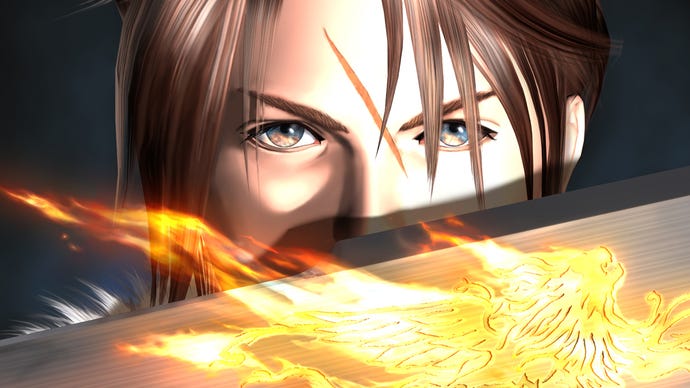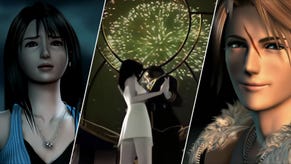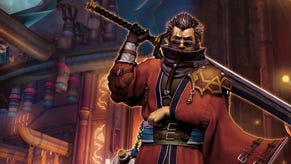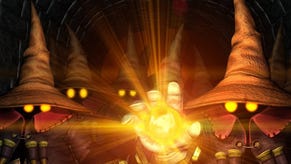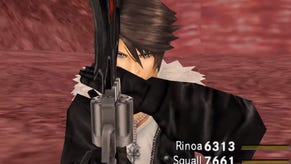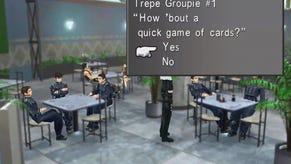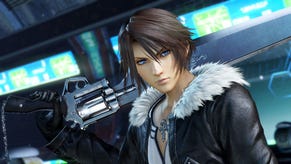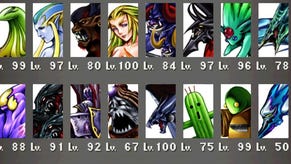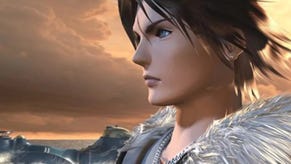Final Fantasy 8 Was Always Good
Reexamining one of the most divisive games in the series on its 20th anniversary.
This article first appeared on USgamer, a partner publication of VG247. Some content, such as this article, has been migrated to VG247 for posterity after USgamer's closure - but it has not been edited or further vetted by the VG247 team.
Final Fantasy 8 was the first RPG I ever broke. I broke it so hard that I could one-shot the boss waiting at the end of Disc One. And I loved it. It was my Final Fantasy; my sentimental favorite game in the series
I say "sentimental favorite" because saying "best" is bound to raise some eyebrows. Final Fantasy 8 has its share of defenders, but few will go to bat for it in the same way they will for Final Fantasy 4, 5, 6, 7, or hell, pretty much any other game in the series. For better or worse, Final Fantasy 8 is seemingly doomed to remain Not Final Fantasy 7—the eternal black sheep.
But 20 years after its original release in Japan, it might be time to finally reevaluate. It might finally be time to stand up and say that, yes, this weird, experimental, and most damningly, different, RPG deserves to be considered more than a sentimental favorite. It may even be time to say what was once unthinkable: Final Fantasy 8 is great. Well, alright... maybe great is too strong. Final Fantasy 8 is good.
To understand what Final Fantasy 8 had to accomplish when it came out in 1999, put yourself in the shoes of director Yoshinori Kitase. You're coming off Final Fantasy 7, a success so transcendent that it popularized console RPGs in North America and made PlayStation the generation's dominant console. Thanks to Final Fantasy 7, Square is now one of gaming's most powerful publishers. You're at the peak of your success.
Now you have to make a sequel. You have a massive audience and a clear formula for success. So what do you do? You get bold. You decide you're going to reexamine the basic assumptions underpinning RPG mechanics and video game storytelling.
That was roughly where Square was at when it started work on Final Fantasy 8 in late 1997. This was Square at the height of its golden age. It wasn't afraid of cooking the golden chocobo; it was thinking about how it could get the series in front of mass audiences. That same year, it established Square Pictures with the intention of turning its FMV prowess into full-blown feature films. That was Square's mindset: go big (and maybe fail horribly, as Square Pictures ultimately did).
That "go big" mentality is most apparent in Final Fantasy 8's opening movie, probably the most ridiculous, overblown, and yet amazing cutscene ever produced. It begins with the crash of drums and an operatic latin choral, swooping across fields and oceans while quickly establishing some of the main characters: Squall, Rinoa, Edea, and Seifer. In an era where fully-animated cutscenes were considered graphical showcases for the PlayStation, Final Fantasy 8's opening montage was a three-minute master class by Square, featuring complex editing and slickly-animated fight sequences. The theme "Liberi Fatali," which was developed by series maestro Nobuo Uematsu, proved so popular that it was later used in the 2004 Summer Olympics.
"Liberi Fatali" was intended as both a callback to previous games and an illustration of how Final Fantasy 8 would be different. Final Fantasy 7's own choral, "One-Winged Angel," had been hailed as one of the best final boss themes of all time, so it made sense for Uematsu to evoke that theme with a brand new, fully-orchestrated latin choral for the sequel. On the flipside, the opening montage also showcased Final Fantasy 8's radically different art style, which replaced the boxy polygons of the previous game with more realistically-proportioned characters.
What followed "Liberi Fatali" was no doubt a shock to many newly-minted Final Fantasy fans. In contrast to Final Fantasy 7's gritty mix of sci-fi and steampunk, Final Fantasy 8's first hours took place in Balamb Garden: a sleek, brightly-colored battle academy closer to something you might see in Star Trek than Blade Runner. This was a deliberate move on Square's part. Having gone dark for two successive games, it wanted to brighten the palette as much as possible with a shiny high-concept sci-fi world.
Even more of a departure were its themes. When the first teasers for Final Fantasy 8 appeared in 1998, it was promoted as a love story. Final Fantasy was no stranger to romance, but it mostly took a backseat to the action plots at the center of each story. Square proposed to put the love story front and center—a bold pitch in an era where games were still mostly marketed to children and adolescent teens.
In the end, Final Fantasy 8 was pretty much a complete rethink of everything that had made Final Fantasy 7 successful. Naturally, the fans hated it.
Anatomy of a Black Sheep
Complaints about Final Fantasy 8 ultimately wound up falling into a handful of familiar buckets. Fans didn't like the complicated Junction System; they didn't like the admittedly dumb reveal that the cast had grown up together in an orphanage and forgotten about it, and they really didn't like Squall Leonhart—Final Fantasy 8's hero. For longtime fans, Squall represented the Nomura-ization of the series. Modeled after the late River Phoenix, Squall was a pouty rockstar with a ridiculous (but awesome) gunblade. He was also an asshole.
In Final Fantasy 8, our first glimpse of Squall comes in the infirmary, where he's recovering from being slashed across the face by his rival, Seifer. Squall quickly shows himself to be cold and aloof. He seems puzzled and irritated by his more boisterous classmates, particularly the cheerful Selphie and clownish Zell, often brushing them off with a dismissive "...Whatever."
His most sympathetic moments are when he's being teased, usually by Quistis, his instructor, or Rinoa, the resistance leader cast as his eventual love interest. It's in these moments that his gruff exterior melts away and he's revealed to be a flustered, awkward teen. The best of these is when he meets Rinoa for the first time and is forced to dance. The look of utter horror and embarrassment on his face is priceless.
But cute as these moments are, there's no getting around the fact that Squall is, well, a jerk. Your investment in the story depends heavily on whether you buy Squall's transformation into the guy who finally cracks a smile in the story's final moments. If you do, then Final Fantasy 8 has a nice little romantic arc. If you don't, well, you're stuck playing as a sullen dork in leather pants.
I tend to take a third path with Final Fantasy 8. As it happens, Final Fantasy 8 has an alternate protagonist. His name is Laguna, and he's the opposite of Squall in pretty much every way.
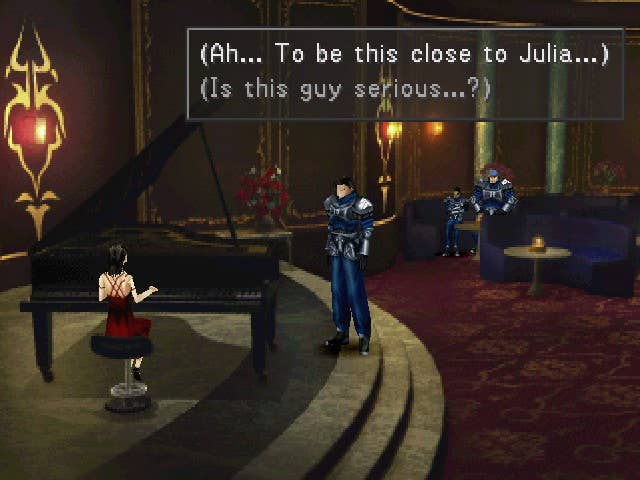
Where Squall is sulky and introspective, Laguna is bright, emotional, and (mostly) pretty mature. He's introduced around the beginning of the second act, as Squall and company head to Timber to meet up with Rinoa's resistance army. After passing out, the group find themselves dreaming of a trio of Galbadian soldiers led by Laguna who are lost in the woods. Their rapport is easy and natural, aided by Final Fantasy 8's sterling localization (FF8 is often credited with having one of gaming's first truly great localizations).
When he eventually gets back to town, we see Laguna kick off his own little romantic arc as his companions Ward and Kiros try to get him to talk to a piano player in a hotel bar. Hilariously, Squall is watching all of this, and his own commentary is overlaid with Laguna's dialogue ("Is this guy for real?") It's the sort of narrative flourish that can only work in a game built purely around text.
Laguna, Kiros, and Ward pop up multiple times throughout the rest of the story, their connection to Squall being one of the game's central mysteries. Their appearances are always a treat, not the least because they're always accompanied by one of gaming's greatest battle themes: the thumping 90's dance beat "Man With the Machine Gun." In one of Final Fantasy 8's funnier moments, Laguna takes a job as an actor in a movie production about the Sorceress War and accidentally encounters a real dragon while filming, resulting in Looney Tunes-like shenanigans as he tries to talk down what he assumes are Kiros and Ward in a costume.
These little asides are reflective of a story that ultimately works best as a series of individual moments. Final Fantasy 8 is full of singular scenes like the assault on Dollet, a pitch-perfect setpiece with terrific music ("The Landing"), a great battle (the chase with the spider-bot), and some interesting mechanics (it's part of a test that eventually determines your starting salary).
In an astonishing sequence near the game's midpoint, Balamb Garden goes to war with Galbadia Garden. The entire battle is depicted in a series of full-motion cutscenes that seamlessly interact with the gameplay. There's a tremendous moment where Squall is hanging from a hover-platform and punching a Galbadian, and the camera swoops up to reveal an army of SeeD students tangling with enemy soldiers in the background.
And of course, in a scene fondly remembered for being as cheesy as it was groundbreaking, Rinoa and Squall enjoy a zero-g cuddle as Faye Wong's "Eyes on Me" plays in the background. It was a big breakthrough for console games: the first instance of a pop song being used to punctuate a major story moment.
When Squall and Laguna finally meet up late in the game, you expect a big payoff, which the story dutifully provides. But their big meeting is ultimately less interesting than the dozen or so little moments leading up to it. And it's in those moments where Final Fantasy 8 still shines the brightest.
Reinventing the RPG
So let's talk about what else the fans didn't like about Final Fantasy 8; namely, that it was different. Really different.
When Final Fantasy 8 first hit shelves in 1999, many of its players picked it up on the strength of Final Fantasy 7. Either they enjoyed Final Fantasy 7 themselves, or they heard that Final Fantasy 7 was amazing through word-of-mouth. Either way, most players in North America were relatively new to both the series and RPGs as a whole.
Final Fantasy 8 was nothing like Final Fantasy 7. It changed everything: magic, experience gain, summons, and even the way new weapons were earned. It took players who were just getting used to the concept of RPGs and tossed them into the deep end of the pool, leaving them to flail helplessly as they lamely summoned underpowered Guardian Forces over and over again.
The basic principle behind the Junction System, as it was called, was that you would find and attach summon monsters called Guardian Forces (GFs) to individual characters. Doing so made it possible to earn AP, which could be used to unlock progressively more powerful skills. Additionally, during battle you could use the Draw command to pull up to 100 spell charges from monsters during battle, then attach those spells to your stats. The more spells you had, the better your stats.
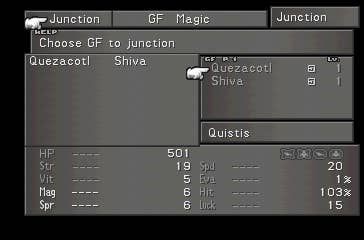
Advanced players soon realized the power and flexibility of the Junction System. Just a few Curagas were enough to heavily boost HP. Pain could be junctioned to inflict multiple status effects on enemies. Individual GFs brought unique passive buffs, dramatically increasing their utility beyond simply dealing damage.
Powerful spells were readily available by refining cards earned in Triple Triad—a deceptively simple card game often hailed as one of the best sidequests ever. Like Witcher 3's Gwent, which would appear more than a decade later, Triple Triad let you challenge NPCs around the world in a bid to collect rare cards featuring the main cast. As you went further and further afield, new and exotic rules would appear and spread to other regions, some of which made winning quite difficult. But if you had the patience to follow through, the rewards were immense. Oh, and the game itself was pretty fun too, especially if you got a chain reaction going and flipped a half-dozen cards at once.
Learning these systems made Final Fantasy 8 much easier, though not entirely trivial. There were some seriously intense challenges to undertake if you were willing to explore a bit, culminating in the insanely difficult Omega Weapon—a bonus boss lurking in the bowels of the final dungeon. Beating Omega Weapon meant utilizing every single system at your disposal while delicately dancing around attacks that could wipe out your entire party in a single hit. Like everyone else, I opted to refine Holy War items that made my party temporarily invincible; but I've heard of at least a few people capable of beating Omega Weapon just by using Rinoa's best limit break. As far as I'm concerned, those people are gods.
It's been a long time since Final Fantasy has demanded real mastery in the way that Final Fantasy 8 did. That was its real secret. It pushed you to figure out all the nuances of the crazy Queen of Cards sidequest; to find the Island Closest to Hell and the Deep Sea Research Facility, and to collect as many GFs as possible. Final Fantasy 8 in turn rewarded you with deeply satisfying easter eggs like the one in the final battle with Seifer, where the Odin GF is sliced in half and subsequently returns to exact his revenge as Gilgamesh.
When I think back on Final Fantasy 8, it's mostly moments like these that stand out to me. Mastering Final Fantasy 8's many systems taught me to love RPGs in a way that even Final Fantasy 6 and 7 never quite managed. It might be why I still tend to prize interesting mechanics over storytelling in RPGs. Yeah, a memorable story is great, but most of my love for the genre involves tinkering with player builds and min-maxing my damage.
The Junction System is pretty crazy by RPG standards, but coming to grips with its many eccentricities remains one of the most rewarding experiences I've had in a game. It's also one of the clearest examples of what I consider to be the best trait of classic Final Fantasy: its willingness to take risks. In a painfully risk-averse industry, Square's response to the overwhelming success of Final Fantasy 7 was to say, "Screw it. Let's try and reinvent the RPG." Only Final Fantasy 12 was more daring.
And so I submit to you that Final Fantasy 8 is good. It has a good battle system, an amazing soundtrack, some memorable characters, and a huge number of interesting secrets to find. If writing this retrospective has shown me anything, it's that Square Enix doesn't make games like Final Fantasy 8 anymore. I can't remember the last Final Fantasy that managed to nail the precise alchemical mixture that used to make the series so compelling. Final Fantasy IX, maybe? Well whatever it is, Final Fantasy 8 has it in a way that Final Fantasy 15, bless its heart, really doesn't.
Final Fantasy 8 was a unique RPG for a unique moment in gaming history. It will always be divisive, if only because it remains joined at the hip to its more illustrious predecessor. But 20 years on, its bold spirit of experimentation shouldn't be forgotten, and neither should its very real strengths.
